 |
| Amazon |
From "Moonwalking with Einstein," by Joshua Foer:
 |
Once upon a time, there was nothing to do with thoughts except remember them. There was no alphabet to transcribe them in, no paper to set them down upon. Anything that had to be preserved had to be preserved in memory."
After the jump, my review and more excerpts.
Grade: C+
I have a pretty good recall of trivia. Truman's vice president? The names of the three handymen on the Newhart television show? Major League Baseball's Mendoza Line? Got it. Got it. Got it. On the other hand, I'm terrible at remembering names. No, that's not it. I don't think I ever bother to hear names in the first place. In one ear and out the other. So, this book with the odd title intrigued me. Moonwalking with Einstein is one of the mental images the author uses to help him remember strings of random numbers.
Reading this book, you will learn the basics of how to perform memory tricks like memorizing a deck of cards in five minutes. But this is not a how-to book. It's more an account of the world of competitive memorizing and the author's year of preparation for competing in the US Memory Championship. If you are interested in competing, it turns out this is a still immature competition that people with average memories can still win, if they devote themselves full time to learning the tricks.
It surprised me to learn that memorization, now considered a rather pointless trick (e.g., why memorize phone numbers when you can just punch them into your cell phone's contact list) used to be considered an essential skill. Before books were printed, they were memorized. (Think of the retellings of the epic Greek poems, The Iliad and The Odyssey.) Early writing served, not as a replacement for memorization, but as an aid to memorization. Memorization skills used to be taught in schools as late as the early 1900s. And, though it's mostly a lost art, memorization tricks can still prove useful today. (Ever have trouble putting a name to a face? There's a trick to help.)
So, read this book and learn about what an absolutely amazing organ the brain is, about how it works, about the history of memorization in education, about the geeky world of competitive memorization, and maybe learn a few tricks to improve your own memory, with practice of course.
Excerpts:
"Memory training was considered a centerpiece of classical education in the language arts, on par with grammar, logic, and rhetoric. Students were taught not just what to remember, but how to remember it."
"The last century has been an especially bad one for memory. A hundred years of progressive education reform have discredited memorization as oppressive and stultifying - not only a waste of time, but positively harmful to the developing brain."
"How did memory, once so essential, end up so marginalized? Why did these techniques disappear? How, I wondered, did our culture end up forgetting how to remember?"
"To use Simonides' technique, all one has to do is convert something unmemorable, like a string of numbers or a deck of cards or a shopping list or Paradise Lost, into a series of engrossing visual images and mentally arrange them within an imagined space, and suddenly those forgettable items become unforgettable."
"Though on the face of it these feats might seem like little more than geeky party tricks - essentially useless, and perhaps even vaguely pathetic - what I discovered as I talked to the competitors was something far more serious, a story that made me reconsider the limits of my own mind and the very essence of my education."
"What I had really trained my brain to do, as much as to memorize, was to be more mindful, and to pay attention to the world around me. Remembering can only happen if you decide to take notice."
Then there are the savants, those whose memorization skills are innate, not learned, and, although limited in subject area, are seemingly unbounded:
"Kim and I spent the better part of our afternoon together sitting at a table in the back corner of the Salt Lake City public library's fourth floor, where he has spent almost every weekday of the last ten years reading and memorizing phone books."
"What interested me most about Daniel was his extraordinary memory. In 2003, he set a new European record by reciting the first 22,514 digits of pi from memory."
"I knew how the mnemonists did it: They'd improved their memories through rigorous training, using ancient techniques. I'd even done it myself. But I didn't understand where Daniel's powers of recall came from."

No comments:
Post a Comment
Keep it courteous, clean, and on topic.
Include your name.
Anonymous commenters are unwelcome.